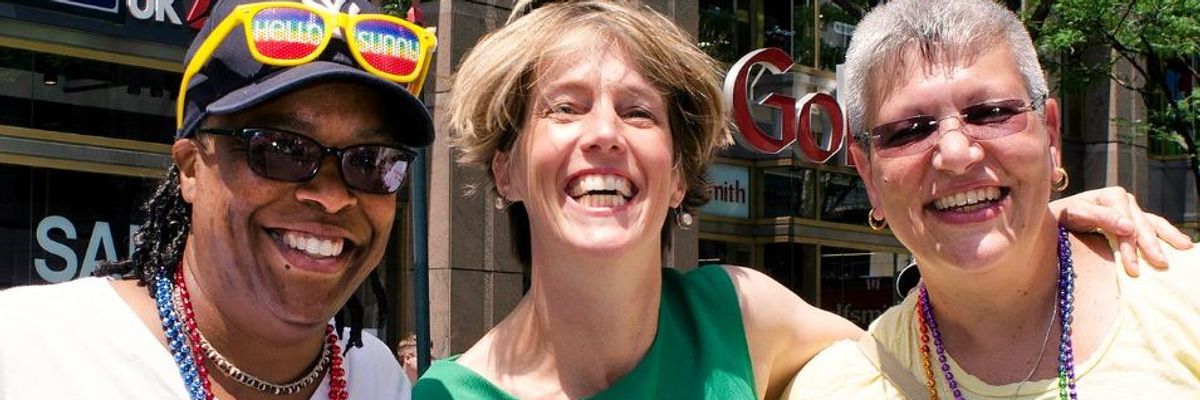We face a crisis in this country: A majority of young Americans have lost faith in our government. According to a 2015 Harvard poll, only 17% of 18-29 year olds trust Congress as an institution.
Having spent three years as a student organizer, I've witnessed this political distrust first hand. Many young people view Congress as an auction house, in which politicians are bought via political donation. Given our dysfunctional campaign finance and lobbying systems, none of this should come as a surprise. Indeed, most Americans of all ages believe politicians are more responsive to large donors than their constituents.
Bernie Sanders has recently brought some optimism to the situation by championing campaign finance reform and inspiring many young voters. But, as my generation learned from President Obama, one politician cannot singlehandedly restore confidence in our government.
Progress is made possible when voters elect enough politicians who actively demand reform. Today, this political coalition exists--lead by Senator Tom Udall (D-NM) and Congressman John Sarbanes (D-MD)--but its members are just too few in number to enact change.
Nevertheless, hope for reform got a big boost earlier this year when Fordham law professor Zephyr Teachout announced she is running for Congress. If elected, not only would she be an ally in the efforts to revitalize our democracy, she would likely be its leading Congressional champion.
I had the chance to meet Teachout at my alma mater, Vassar College, in the fall of 2014. She was on a book tour for her then recently published Corruption in America and my Democracy Matters chapter members and I hosted her for a lecture.
As a New Yorker, I was already familiar with Teachout, having closely followed her primary challenge to Governor Andrew Cuomo earlier in the fall. Although she lost, Teachout and her grassroots populist message put up an impressive fight, winning almost 35% of the vote and 31 out of 62 New York districts. It was only after meeting her, however, that I understood why her political career was so encouraging.
When she spoke to us at Vassar, Teachout was extremely likeable, easy to talk to, and also quite funny. She vividly and lucidly discussed how big money corrupts our political system. Her passion was contagious and her desire for reform was sincere. Once she had finished, the audience erupted in a standing ovation and many students who had previously never heard of her were now passionate devotees.
In many respects, Teachout's political career should have never taken off. Her fight against Gov. Cuomo was the epitome of a David and Goliath story. On one side was the incumbent governor who had a $35 million war chest and political connections spanning back to his father (who had held the same position three decades prior). On the other side was a woman who had never held public office, had virtually no big money backers, and lacked name recognition. The battle was perceived to be so one sided that Gov. Cuomo acted as thoughshe didn't exist.
Mr. Cuomo's "non-existent" challenger had a secret weapon, though. She was able to light a fire in the hearts and minds of grassroots supporters. Teachout truly made people believe that change was possible. And, even after the primary, that fire continued to burn in some of her more veteran supporters--quite a few of whom visited Vassar that day just to see her speak.
Following her lecture, Teachout joined us for dinner, during which she shared vibrant stories of running her primary campaign, organizing for Howard Dean in 2004 and being a guest on TheDaily Show. In private, she came across exactly as she had in the lecture hall--amiable and interested in conversation. This sincerity deeply appealed to my peers and me.
So too did her political beliefs. Her authentic, unwavering desire to tackle political corruption made it clear that instead of pandering to corporate lobbyists she preferred to empower ordinary Americans. This commitment to all Americans was echoed in her willingness to speak out for the public even if it created powerful enemies in the process (e.g. protecting net neutrality, banning fracking, and decrying income inequality).
When I saw Teachout speak to a different group of students a few months later it was apparent that her ability to motivate young people was no fluke. She made even the most cynical youth believe we could fix our democracy. For this reason, my friends and I never debated if she would run for office again--rather we sparred over which office it would be.
Now we know the answer: Congress. And fittingly, she is running for the open seat in the Dutchess County district adjacent to where we first met (vacated by retiring Republican Congressman Chris Gibson).
This time around, the once "invisible" primary challenger has an even more impressive resume. Not only did she spend the last year continuing to fight for the people of New York, she also served as the CEO of MayDay, an organization fighting to get big money out of politics.
If this wasn't enough of a show of strength, Teachout's grassroots base is fired up. She has already raised over $500,000, a large portion of which came from small money donors. She has also garnered endorsements from local Democratic groups, Democracy For America, the Working Families Party, and established politicians, such as Congressmen Sean Patrick Maloney (D-NY).
If Teachout is elected to Congress, her victory will have national implications. Her desire to make government work for the people has prompted some to suggest that she could very well become the next Elizabeth Warren.
Of course, Teachout has yet to even win her primary, so there is still a long road ahead. And, electing reform politicians is also only part of the solution. We must also develop a citizen-based movement to pressure those who block progress. Democracy Spring and Democracy Awakening are important examples of such a movement and their efforts must be continued.
Nevertheless, as long as candidates like Teachout continue to run for office, a more equal and representative democracy remains within our collective grasp--a fact that should give young people renewed hope.


